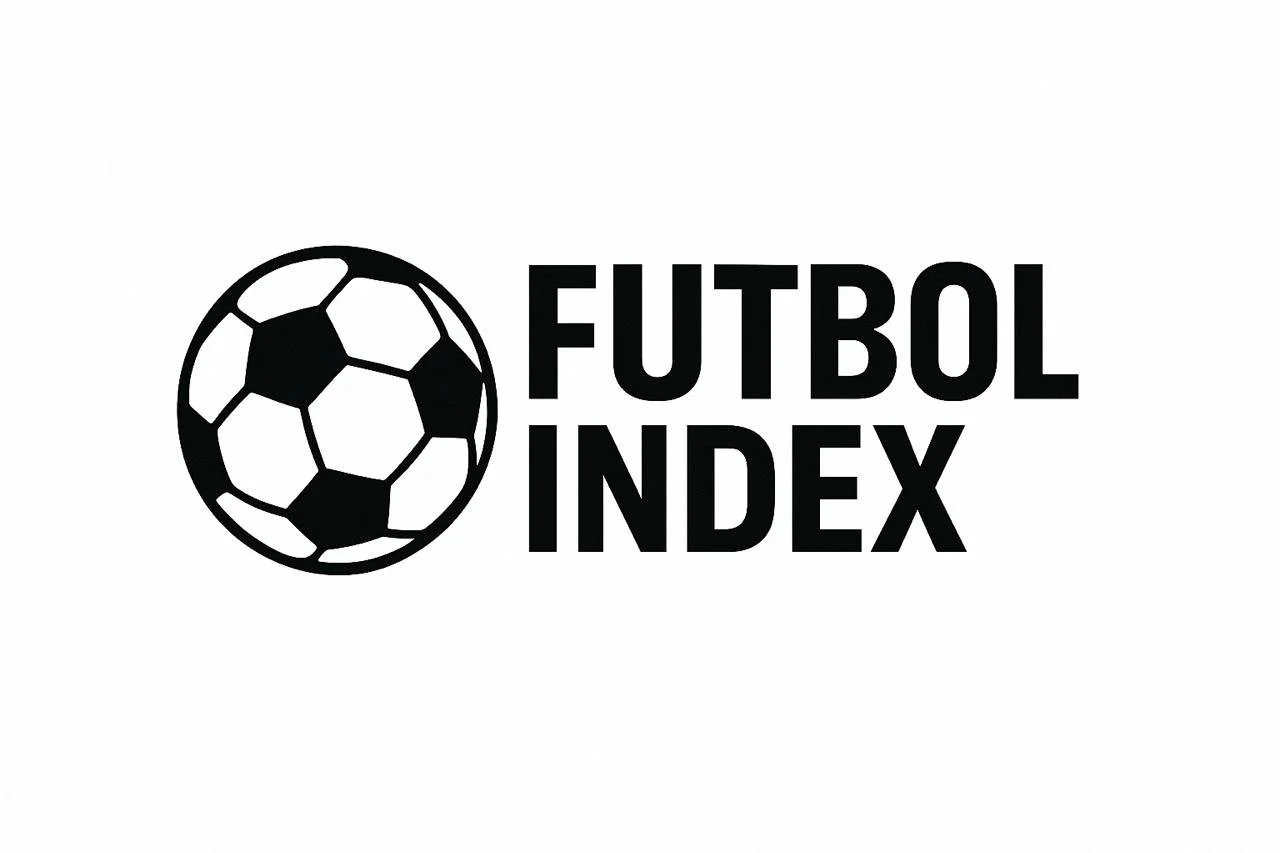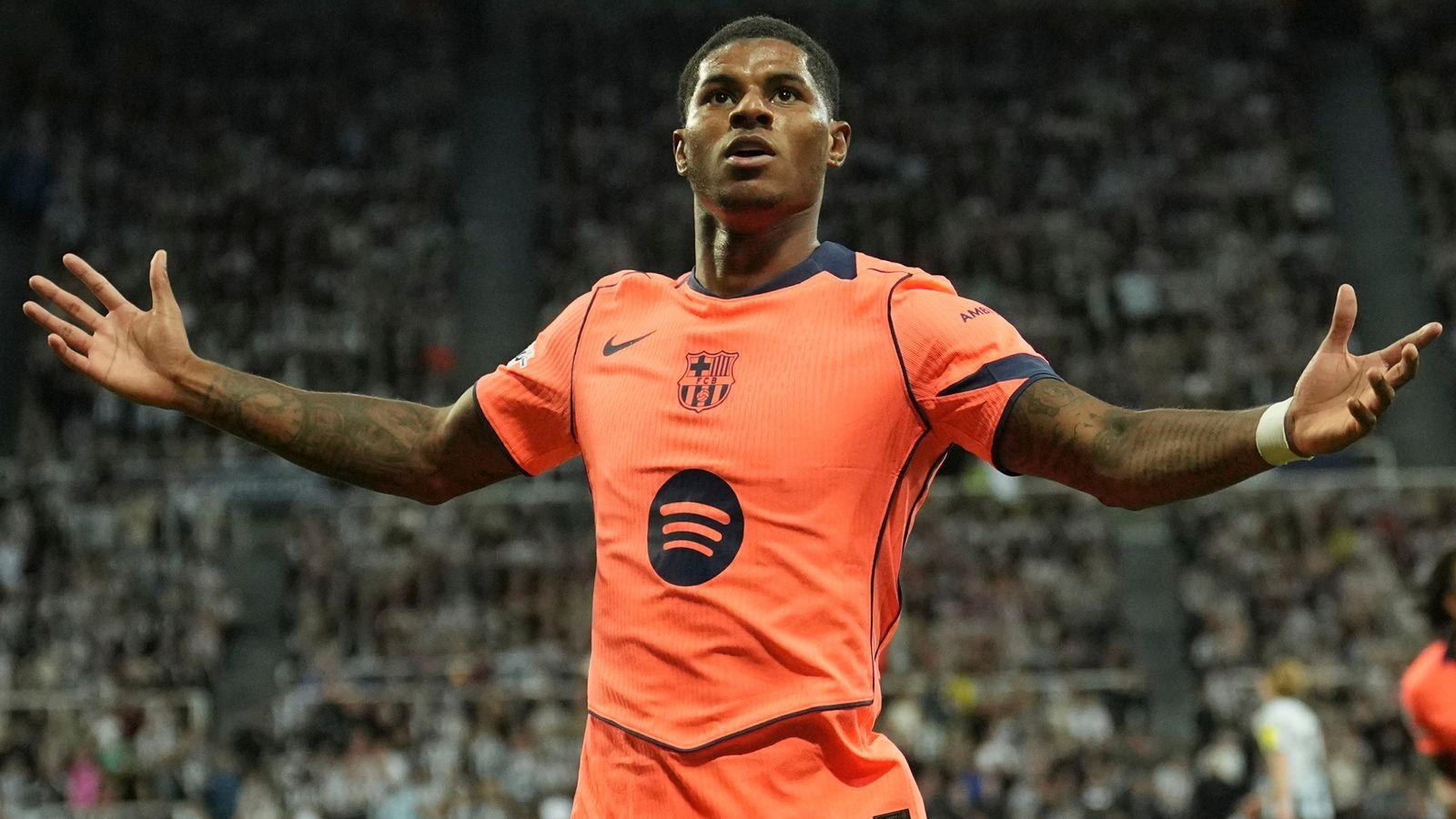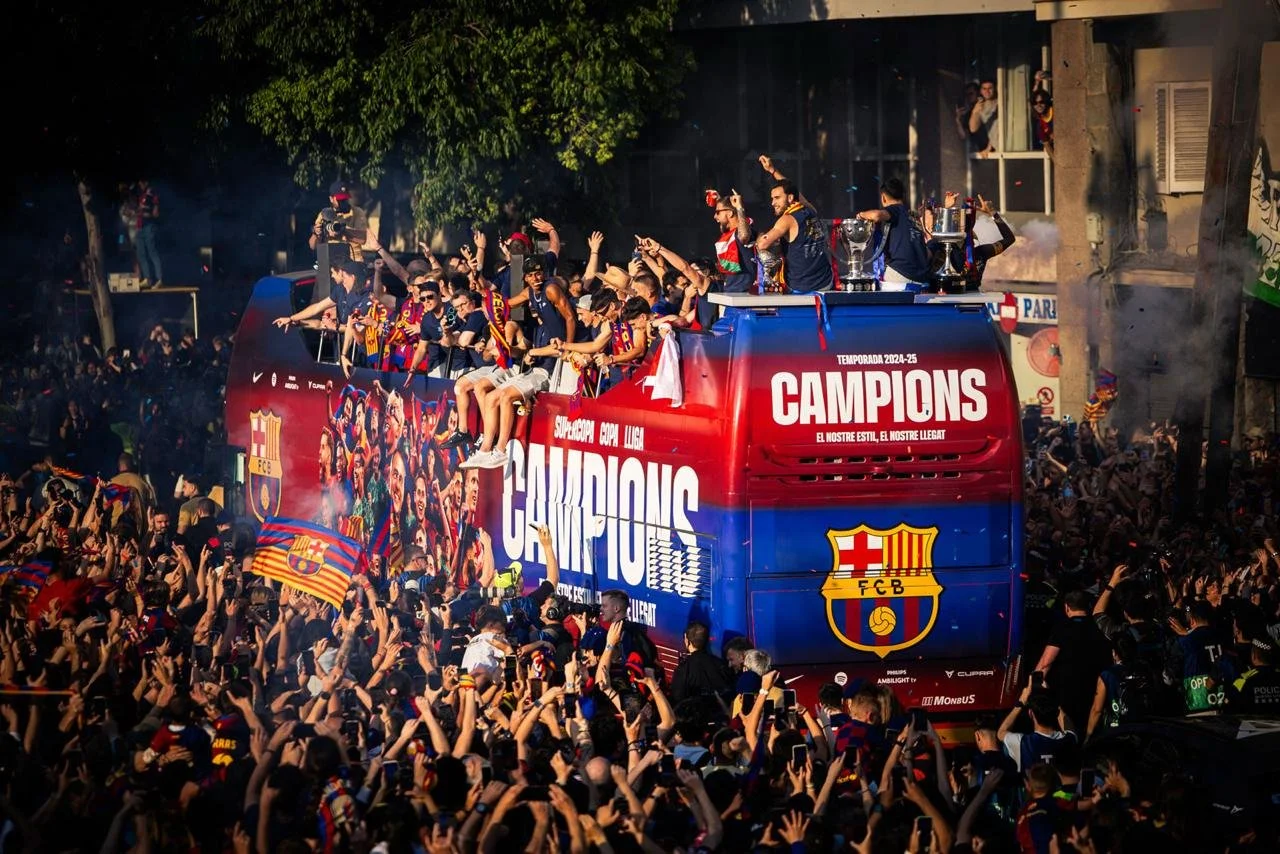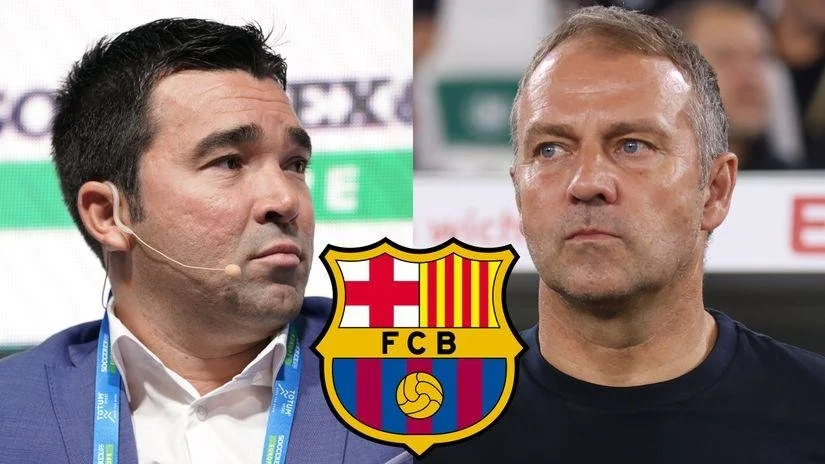FC Barcelona So Far This Season: A Campaign of Extremes, Lessons and Collective Growth
By Ashutosh Welankar
A Season Defined by Contrast
FC Barcelona’s 2025/26 season so far has unfolded at two very different ends of the spectrum. Performances have alternated between dominance and collapse, making it a campaign full of drama and uncertainty. For neutral fans, it has been entertaining; for Barcelona supporters, emotionally exhausting. While last season’s highs under Hansi Flick still shape expectations, this campaign has followed a different rhythm. A deeper look reveals a side that has evolved sometimes positively, sometimes painfully, with one recurring theme standing out: Barcelona’s fortunes have closely followed the presence, or absence, of key figures such as Raphinha and Joan García.
Oviedo: The Night That Changed the Season
That optimism collapsed abruptly in Oviedo. In the 66th minute, Raphinha was forced off after pulling up, initially dismissed as a routine muscle issue. By the following morning, the reality was far harsher. Raphinha had suffered a right hamstring injury, while Joan García sustained a medial meniscus tear in his left knee and required arthroscopic surgery. Losing a key attacking outlet and the first-choice goalkeeper in the same game proved devastating and marked the beginning of Barcelona’s most turbulent phase of the season.
October’s Collapse and Loss of Balance
October quickly became the darkest month of Flick’s tenure. A painful Champions League defeat to PSG at home was followed by a humiliating 4–1 loss in Seville. Defensive organisation collapsed, urgency faded, and confidence drained. The low point came against Real Madrid, where Barcelona was beaten after having dominated recent Clásicos. Without Raphinha, the team continued to score but lacked consistency and intensity. His relentless work rate, pressing, and movement were sorely missed. At the other end, García’s absence, combined with Iñigo Martínez’s earlier departure, left the defence exposed, and goals were conceded far too easily.
November Struggles and the Turning Point
The instability spilled into November, particularly in Europe. A frustrating draw against Club Brugge and a humbling defeat at Stamford Bridge underlined the lack of balance. Yet that Chelsea match also marked a turning point. Both Raphinha and Joan García returned to the lineup after regaining full fitness, and from that moment, Barcelona’s season began to shift.
December to January: Control, Consistency and Silverware
From early December to 1 February 2026, Barcelona played sixteen matches and lost only once against Real Sociedad in a game Raphinha again missed due to a knock. With him back in the side, Barcelona went on an eleven-game winning streak across all competitions. That run included a commanding Spanish Super Cup victory over Real Madrid, a result that ultimately cost the Madrid manager his job. Momentum carried into Europe as well, with Barcelona finishing inside the top eight of the Champions League group stage, sealing qualification with a dominant 4–1 away win in Denmark. By the end of January, Barcelona had already lifted the Super Cup, progressed in the Copa del Rey, and climbed to the top of La Liga with 55 points from 22 games.
What’s Gone Right for Barcelona
Joan García: Stability at the Back
One of the most significant positives of the season has been the impact of Joan García. His arrival has transformed Barcelona’s defensive outlook. Calm, authoritative, and composed under pressure, García has brought much-needed stability. In 16 La Liga matches, he has kept eight clean sheets, maintaining a remarkable 50% success rate. He has faced 53 shots on target and conceded just 12 goals in the league. In the Champions League, he started 5 matches, dealing with 20 shots on target while conceding 8 goals. Across both competitions, his total of 53 saves underlines his reliability in high-pressure situations.
Marcus Rashford: Opportunity Taken
Another encouraging storyline has been the resurgence of Marcus Rashford. Signed on a season-long loan as a depth option, injuries to both Yamal and Raphinha handed him extended responsibility. Rashford responded decisively, registering 19 G/A with 10 goals and 9 assists across competitions. His pace, experience, and maturity provided balance and continuity during a demanding period.
Collective Responsibility Over Individual Dependence
Perhaps the most important positive has been Barcelona’s clear shift toward collective responsibility. Rather than relying on one standout individual, contributions have been spread throughout the squad, creating balance and resilience. Lamine Yamal leads the way with 25 goal involvements (13 goals, 12 assists), but the real significance lies in the support around him. Ferran Torres (16 G/A—15 goals, 1 assist) and Robert Lewandowski (12 G/A—11 goals, 1 assist) have offered consistency in front of goal, while Raphinha has combined creativity with end product through 13 G/A (9 goals, 4 assists). Fermín López has quietly emerged as one of the side’s most influential all-round performers with 17 G/A (9 goals, 8 assists), and Dani Olmo’s impact has further strengthened the team’s balance, contributing 11 G/A (7 goals, 4 assists). Alongside Marcus Rashford’s contributions, these figures highlight an important statistical trend: Barcelona’s attacking output is distributed across the squad rather than concentrated in a single player. This spread of goals and assists has made the team more unpredictable and better equipped to manage injuries, rotation, and tactical adjustments, pointing toward a more sustainable attacking structure.
Off the Pitch: Smart and Measured Decision
João Cancelo’s Return and Tactical Flexibility
Barcelona’s January decision-making reflected growing maturity. The loan arrival of João Cancelo added immediate value. Familiar with the club and tactically versatile, Cancelo has provided depth across both flanks and allowed Flick to explore internal solutions by allowing and integrating Gerard Martin to play as a left-footed centre back to provide balance, particularly following Iñigo Martínez’s departure. Cancelo’s presence has strengthened both defensive coverage and attacking flexibility.
The DRO Fernández Sale and Long-Term Planning
The departure of DRO Fernández to PSG could have destabilized the squad, but Barcelona handled the situation pragmatically. The club negotiated a fee of around €8.5 million and reinvested it into four young players—Juwensley Onstein, Hamza Abdelkarim, Patricio Pacifico and Ajay Tavares. All four have been integrated into Barça Atlètic, allowing them to adapt to the club’s playing style, tactical demands, and culture before first-team exposure. This patient approach contrasts sharply with past missteps, most notably the case of Vitor Roque, whose immediate promotion to the first team hindered his adaptation and led to a premature sale.
Conclusion: Signs of a More Mature Barcelona
Barcelona’s season so far has been uneven, emotionally demanding, and, at times, chaotic. Yet beneath the turbulence lies a clearer sense of direction. The emphasis on collective output, smarter squad management, and patient player development suggests a club learning from past mistakes. As the decisive phase of the campaign approaches, Barcelona appears better prepared structurally and mentally to sustain a genuine challenge on all fronts. This may not yet be a finished product, but it is unmistakably a more mature Barcelona in the making.
Barcelona’s Bumpy Ride: Flick’s Men Fighting Fire with Fire
By Ashutosh Welankar
After a successful campaign last season with FC Barcelona, Hansi Flick looked ready for another intense year at the helm. The Catalans made a few tweaks during the summer window, but the core of the squad remained largely intact, fuelling fans’ hopes for another dominant season.
However, two months into the campaign, Barcelona’s journey has been nothing short of a rollercoaster. Let’s dive into how the Blaugrana have fared so far.
A Stuttering Start to the Season (August)
Coming off an impressive preseason, Barcelona appeared poised for a bright start. But the departure of Inigo Martínez exposed defensive cracks early on. In their first three games, the Catalans looked uncertain—shaky at the back, inconsistent in midfield, and far from their fluent best.
Hansi Flick’s constant rotation in defense didn’t help either. Leaky goals became a trend, and against Rayo Vallecano, Barca were fortunate to escape with a point thanks to their new signing, Joan Garcia, who stood tall between the sticks.
Post-match, Flick didn’t mince his words:
“We lacked intensity and made mistakes. I am not happy with my team today; I expect more from them.”
Then came the line that echoed across Barcelona’s dressing room:
“I don’t want egos. Egos kill success. Last year we were a team, and we must continue to play as a team.”
Those words set the tone for what was to come.
Redemption After the Break (September)
Even before the international break ended, disaster struck: Lamine Yamal suffered an injury, ruling him out for weeks. But instead of breaking, the team responded with resilience and fire.
Against Valencia, Barcelona was reborn—ruthless, expressive, and electric. The 6-0 thrashing reminded everyone of Flick’s philosophy from last season. Fermin López announced himself as the perfect creative spark in midfield, thriving as the chosen CAM.
Then came the defining night, a Champions League showdown at St. James’ Park. The atmosphere was hostile, the challenge immense. But as they say, “Diamond cuts diamond.”
Barcelona’s own Englishman, Marcus Rashford, rose to the occasion. He “carved through Newcastle United with ruthless precision,” scoring twice and silencing the roaring Geordie crowd. That night marked the start of his golden chapter in Blaugrana colors.
Barcelona’s form carried into LaLiga, brushing aside Getafe, Real Oviedo, and Real Sociedad. With 11 different players on the scoresheet, the balance looked restored until fate intervened again. Injury woes returned, claiming Raphinha, Fermin López, and the sensational Joan Garcia. Just as everything seemed settled, dark clouds gathered once more.
Slipping on Thin Ice (October)
The momentum faded as the injuries piled up. Barcelona looked unsure, and their confidence dipped. Then came the biggest test of Flick’s tenure so far: a home Champions League clash against PSG, the reigning European champions.
The Montjuïc roared in anticipation, and the game delivered fireworks. Barca struck first through “Rashford, the old nemesis of PSG,” who set up Ferran Torres for the opener. But the ghosts of defensive frailty returned. Poor positioning and an overly aggressive high line cost them dearly, as Gonçalo Ramos scored in the 90th minute to snatch victory for PSG.
If that was a heartbreak, the next match was humiliation. A struggling Sevilla dismantled Barcelona 4-0, exposing their defensive chaos. The high line that once suffocated opponents now strangled their own rhythm. For the first time under Flick, the Catalans looked lost.
Star Performers So Far
Despite the turbulence of recent weeks, not everything at Barcelona has been bleak. Amid the injuries, tactical shifts, and moments of frustration, a few individuals have risen above the uncertainty carrying the team forward with their consistency, leadership, and spark. Their performances have not only kept Barcelona competitive but have also embodied the resilience and fight Flick demands from his men
1. Marcus Rashford: The English Diamond in Blaugrana
Initially criticized for struggling to adapt, Marcus Rashford silenced doubters in emphatic fashion. His brace at Newcastle reignited Barcelona’s season and cemented his spot in the lineup. With 7 goal contributions in 10 games, the Englishman has finally found his rhythm and Barcelona has found their game-changer.
2. Eric García: From Fringe to Fundamental
Once written off, Eric García has transformed under Flick’s tutelage. Whether at left-back, center-back, or even CDM, he’s been Mr. Reliable. His versatility and composure have made him indispensable—the quiet leader in a team full of stars
The Ongoing Crisis and the Road Ahead—Can Flick Turn It Around?
The October international break brought more misery for FC Barcelona. With Gavi, Raphinha, Joan Garcia, Fermin López, and Lamine Yamal already sidelined, the so-called “FIFA Virus” struck again. Ferran Torres, Dani Olmo, and Robert Lewandowski all returned early from international duty due to injuries and fatigue, further depleting the squad.
With El Clásico looming and defensive uncertainty growing, Hansi Flick faces his toughest challenge yet: restoring stability and belief in a team battling both physical and mental fatigue. The German tactician must rebuild his fortress before Real Madrid comes calling.
So far, Barcelona’s season has been a blend of brilliance and breakdowns a story of resilience amid adversity. Injuries, inconsistency, and pressure have tested Flick’s philosophy to its core, yet the hunger remains alive in the dressing room.
If the Catalans can overcome their fragility, rediscover their unity, and re-establish their defensive identity, this campaign could still transform into something special. Because, as they’ve shown before, even when the fire burns hottest, Barcelona always fights fire with fire.
25/26 Transfer Review: FC Barcelona
Barcelona’s Double Life: Flick’s Ferrari on the Pitch, Deco’s Dilemma off-field
Success on the Pitch, Chaos off It
FC Barcelona and its fanbase experienced a highly successful last season. The club had brought the German wizard Hansi Flick, who instantly delivered success and joy to its fans. The Blaugrana went on to clinch a domestic treble and a dream Champions League run after years of heartbreak and disappointment. Flick’s attacking brilliance, tactical flexibility, and trust in young players created a side that looked like Barcelona of old—dominant, fearless, and joyous to watch.
But as the saying goes, “Every cloud has a silver lining.” For Barcelona, that lining was not golden—it was a reminder of the club’s frailties off the pitch. Beneath the silverware and champagne celebrations lay a story of inefficiency, bureaucratic battles, and financial handcuffs. The shadow of La Liga’s Financial Fair Play (FFP) restrictions loomed large, and instead of celebrating stability, Barça fans were forced to relive the déjà vu of courtroom battles and deregistration’s.
Last season symbolized the contrast: smooth, champagne football on the field but turbulence off it. While Dani Olmo’s signing from RB Leipzig initially felt like a straightforward coup, the real drama unfolded at the registration desk. Because of Andreas Christensen’s injury, Barcelona could temporarily register Olmo, but only for half a season. The board promised to resolve the FFP issue by January 2025, yet when the deadline came, they failed spectacularly. La Liga promptly deregistered Olmo, sparking a messy legal spat between the league and its most storied club.
The irony was painful—Barcelona, a global giant, lifting trophies like a Ferrari on grass, yet stalling in the garage because the front office couldn’t navigate financial rules.
A New Era Under Deco—or a Step Backward?
When Joan Laporta returned as president, he relied heavily on Mateu Alemany as sporting director. Alemany, despite financial chaos, pulled off remarkable deals—Robert Lewandowski, Jules Koundé, and more. He was a master at creative negotiations, striking a balance between Barça’s ambitions and their grim bank statements.
But after his departure, in came Deco—a beloved former player but a novice in high-level sporting administration. Since his arrival, Barcelona’s transfer operations have looked chaotic and directionless. Every signing turned into a saga, every outgoing dragged on, and the club’s long-term strategy seemed to blur.
The Olmo fiasco perfectly reflects this. If Deco and the board knew the financial situation, why chase a deal they couldn’t sustain? If desperate, why not plan an exit strategy in parallel? The lack of foresight fuelled questions about Deco’s suitability for the role.
Optimists argued it was a one-off mistake. But when similar sagas unfolded again this summer, the doubts grew louder: is Deco truly the right man to guide Barça through this delicate phase?
Ter Stegen Turmoil: The Captain Who Lost His Place
Marc-André Ter Stegen’s situation epitomizes the tension between sporting decisions and administrative mismanagement.
At the end of last season, it was evident that Barça’s first-team captain was no longer Flick’s preferred choice. The German coach trusted Wojciech Szczęsny, leaving Ter Stegen’s future uncertain. Reports suggested Ter Stegen had no intention of leaving unless heavily compensated.
Then came the twist: Ter Stegen announced he would undergo surgery, side-lining him for months. The club, desperate to free salary space, tried to use his absence to their advantage under La Liga’s rules. But Stegen publicly contradicted their narrative, declaring his recovery would take only three months. Worse, he did so without consulting club doctors—sparking a major fallout.
The board’s response was drastic: they stripped him of the captaincy. But then a compromise was reached, and he eventually regained it.
The drama wasn’t just about egos. It directly affected Barça’s registration battle. Szczęsny and new signing Joan Garcia had to race against time to be registered. Once again, Barça’s financial juggling act left key players in limbo just before the season kicked off.
Transfers: Bargains, Blunders, and Missed Opportunities
Barcelona has never been a selling club in the way the Premier League giants are. But under Deco, their inability to offload players has reached crisis levels.
Consider Clément Lenglet. After an impressive loan at Atlético Madrid, he should have commanded a transfer fee. Instead, Barcelona terminated his contract, allowing him to join Atlético for free. In one stroke, Barça strengthened a direct rival without financial compensation.
Youngster Pablo Torre, one of Spain’s U21 standouts, was sold for just €6 million upfront. Pau Víctor, another promising talent, left for €12 million. In total, the Blaugrana raised just €23 million—an amount dwarfed by what mid-table Premier League clubs receive for squad players.
Incoming transfers, meanwhile, reflected both ambition and desperation. Joan Garcia, Espanyol’s highly rated goalkeeper, cost €25 million. Marcus Rashford arrived on loan from Manchester United, a blockbuster deal in name but one with significant salary implications. Roony Bardghji, the Swedish wonderkid, also joined to provide depth on the wings.
On paper, Barcelona spent €27.5 million while earning €23 million—a net spend of just €4.5 million. But the story wasn’t in the numbers. It was in the imbalance: strengthening attack while weakening defense, adding salaries while still shackled by FFP, and failing to maximize sales.
Registrations! Ahh, Here We Go Again!
Barcelona supporters felt the déjà vu again in this transfer window. Again, owing to their financial restructuring coupled with the infamous La Liga “FFP Rules,” they struggled with registering their signings. With the new Spotify Camp Nou not yet operational and the much-talked-about VIP seats deal in ratification, Barca had relied upon reduction of wage bill and outgoing to make room in their FFP limits for registration. It started with Lenglet leaving for free, followed by Fati on loan. Then came one plot twist with the arrival of Rashford on a 14 million net salary; it was evident somebody had to leave. Initially it looked like it would be the German keeper, but as discussed above, he ended up staying.
Then came perhaps the shock of the season for Barcelona supporters. Well-known journalist Fabrizio Romano, in his famous style, said, "Here We Go." “Inigo Martinez to Al Nassr."
The Spanish defender who was referred to as instrumental in ‘Barcelona’s high-line defensive approach’ has left the club for Saudi Arabia. One question that came to everyone’s mind was “What just happened? and why?”
In order to register Rashford with his net annual salary for the year, the club decided to let go of one of their best defender from last season. Inigo Martinez's net salary of 14 million a year is exactly what Rashford was about to get. So on record it was a straight swap deal for the Catalans: Inigo “OUT” and Rashford “IN.”
With this swap, what was its impact on the field? Yes, in attack another exciting option was added, but in defense it had lost the orchestrator of the famous offside trap, which was highly successful last season. Also, Inigo was their only left-footed center back in the squad, which meant someone will have to play out of position in that defense.
The impact of Inigo leaving is evident in the first three matchdays of the season. Defense, which looked solid and confident throughout the last campaign, was shaky and nervy, resulting in Hansi Flick experimenting in order to get his backline solidified for the season. This experimentation and nerves resulted in Catalans leaking goals and even dropping crucial points at the start of the new campaign.
Even after the departure of Inigo, the registration issue remained unsolved, as till the final few hours before the window shut, Catalans somehow managed to register Wojciech Szczęsny and Gerard Martin owing to the departure of Hector Fort and Pablo Torre for cheap.
Their newest arrival, Roony, eventually had to be registered with a second team license but will be allowed to play for the first team.
Lessons from Rivals: What Barça Can Learn
Barcelona’s struggles are not unique—clubs like Inter Milan, Juventus, and even PSG have danced around FFP rules. The difference is in execution. Inter, for instance, sold Onana and Brozović for healthy fees while still competing for trophies. PSG routinely balances superstar arrivals with high-profile exits.
Barça, however, consistently weakens themselves: losing assets for free, selling cheap, and replacing them with risky short-term loans. The lack of coherent planning is glaring compared to their European rivals.
Conclusion: Double Life Exposed—Ferrari Racing, Engine Stalling
Barcelona remain a Ferrari on the field under Flick, dazzling fans with their performances. But off it, under Deco’s watch, the club looks sluggish, disorganized, and reactive. The Catalans cannot afford more courtroom battles, deregistration, or financial missteps.
For Deco, the challenge is monumental. He must blend his football knowledge with sharper planning, financial discipline, and long-term vision. The stakes are enormous: Barça’s golden generation of youth—Yamal, Gavi, and Balde—cannot be wasted by bureaucratic mismanagement.
The question remains: Can Deco shift gears fast enough, or will Barcelona’s off-field chaos continue to stall their long-term vision? For now, Flick’s Ferrari races forward, but without a steady pit crew, the ride could end in a crash.




